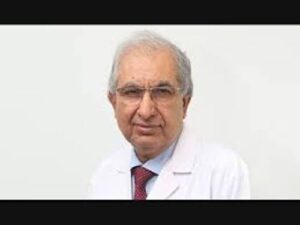Author: G C Khilnani, Chairman, PSRI Institute of Pulmonary Critical and Sleep Medicine. Formerly: Professor and Head of Pulmonary Critical care and Sleep Med AIIMS, New Delhi 110029
Wherever The Art of Medicine is Loved, There is Also a Love for Humanity
New Delhi, September 08, 2024:
 Hippocrates: More than a century ago the famous Physician Dr. William Osler (1849-1919), a Professor of Medicine at Johns Hopkins School of Medicine, U.S.A., said that Medicine is an art based on science which is so true even today despite scientific progress. With advances in diagnostic and management strategies, there is more dependence on techniques including laboratory tests, devices, radiology, and artificial intelligence leading to accurate diagnosis. This has also led to high expectations on the part of patients for correct diagnosis and appropriate treatment. However, the quality of care and patient satisfaction are also determined by active listening, compassion, respect for the patient, and empathy.[1] Quite often we physicians take credit of making an accurate diagnosis and curing the patient. This is something that inculcates some kind of arrogance and should be the last thought one should have.
Hippocrates: More than a century ago the famous Physician Dr. William Osler (1849-1919), a Professor of Medicine at Johns Hopkins School of Medicine, U.S.A., said that Medicine is an art based on science which is so true even today despite scientific progress. With advances in diagnostic and management strategies, there is more dependence on techniques including laboratory tests, devices, radiology, and artificial intelligence leading to accurate diagnosis. This has also led to high expectations on the part of patients for correct diagnosis and appropriate treatment. However, the quality of care and patient satisfaction are also determined by active listening, compassion, respect for the patient, and empathy.[1] Quite often we physicians take credit of making an accurate diagnosis and curing the patient. This is something that inculcates some kind of arrogance and should be the last thought one should have.
We impart treatment to the best of our knowledge and skill that we have acquired; but healing is the wish of almighty. On the contrary, we should be ever so ready to admit our inadvertent mistakes and learn from such events. One should also realize that knowledge is essential, but experience is very important which comes only by managing patients with a sense of responsibility, care, and empathy. Howsoever senior or experienced one may be; there is always a scope of error of judgment in diagnosis and treatment. My teacher and mentor, Late Professor J. N. Pande always used to say “Patients are your best teachers; Learn from them.” I always remember these “words of wisdom” and time and again realize, how true this narrative is.
The art of medicine is a combination of knowledge of science and practice of medicine. This is not learnt from books but by caring for patients with sound knowledge of medicine, genuine concern for patient sufferings, and zeal for care and providing comfort, without any other consideration. An active listening with compassion, a detailed history, and addressing all concerns goes a long way in providing comfort. Besides, a detailed clinical examination and history compounded with available advanced investigation make “best medical practice.”
Many times, despite full knowledge of a particular disease, one is stuck with a decision on particular treatment strategy, especially so when the robust evidence of benefit is not there in the literature. At that time, we make decisions in the interest of the patient’s welfare (called “off-label treatment”) and there the use of “Art of Medicine” comes into play. Furthermore, the issue of “Trust” between doctor and patient relationship plays a great role in acceptance and also to some extent response to treatment. We should all understand that “Lack of evidence is not evidence to contrary” and use this thinking in our day-to-day practice with background knowledge and experience. In the current era of mistrust between patients and doctors, the practice of defensive medicine is very common and there comes the value of “Trust.”
God has granted us doctors, a unique opportunity to impart assistance to persons suffering. The acronym compassion, assistance, respect, and empathy should never take a “back seat” and should be the main motto. Empathy which essentially means “capacity to share and resonate with both the positive and negative feelings of others” is the foundation of medical care. Patient’s feeling of being “cared for” adds to the response to treatment and development of a bondage leading to trust which goes beyond medical fees and compensation.
“Trust” is at the forefront of any relationship; be it a friend or relative, professional colleague or spouse.[2] It is an element to be cherished and nurtured and requires actions which are selfless, honest, and well meaning. In that context, patient-doctor relationship is very special where the patient expects complete involvement on the part of the doctor to take care of his suffering with compassion, responsibility, and empathy.[3] This puts tremendous responsibility on the part of physicians to impart honest and expert care without any other consideration. The outcome of doctor’s treatment and patient satisfaction is affected by the trust the patient has and that same is determined by the physician’s thought process and attitude toward the patient and his medical ailment.
It is a common feeling that presently there is deteriorating trust between patients and doctors. Unfortunately, health care is becoming an industry where the doctor is a service provider and the patient is the user. Because of expensive equipment used for diagnosis and treatment, the cost of care has increased several folds. On the other hand, in India, society has respect for doctors and it is our duty to conduct ourselves in a manner so that the same is maintained. It is extremely important to empathize with the patient and impart a feeling that we understand their suffering and grant active listening to their woes and involve in conversation not liming to tablets and injections. Once the patient realizes the sincerity, honesty, and genuine concern, he or she automatically trusts the doctor. Patient’s confidence and trust in his doctor enhances the outcome of treatment and a feeling of well-being.
Quite often there are no straight answers to patients’ health ailments and one uses knowledge and experience to decide in the interest of patient’s care. This is the reason that the practice of medicine is termed “Art of Medicine”. Our profession involves caring for suffering human beings where “error of judgment” leads to suffering and at times irreparable damage. No one, howsoever learned or experienced, can claim or think that his clinical judgments are always correct. Therefore, the trust of the patient is of paramount importance which comes from practicing medicine with knowledge, honesty, and following high ethical and moral values. Practicing “Art of Medicine” with sound knowledge, surely, is an antidote for deteriorating patient-doctor trust.
Unlike the Western world, the Indian patient-doctor relationship is not yet that of “client and service provider.” Even now the patients submit themselves to their doctor and want to respect their decisions with a sense of gratitude. That puts a great responsibility on us to conduct ourselves and radiate a feeling of care to the patient which is so important in enhancing the “Trust.” Patients come to a doctor as they know that you have good knowledge and clinical acumen but it is more important that they should get a feeling that you “care for them.” I strongly feel that practicing medicine with sound scientific knowledge and care can achieve that. Finally, no doctor should forget or deviate from the Hippocratic Oath to which we are bound for life.
Hippocratic Oath
‘I shall work with my profession to improve the quality of medical care and to improve the public health, but I shall not let any lesser public or professional consideration interfere with my primary commitment to provide the best and most appropriate care available to each of my patients’.
Author: Khilnani, G. C.”This article is an expression of my thought process and my gratitude to my patients”
Source: Journal of Current Cardiology 2(2):p 127-128, May–Aug 2024. | DOI: 10.4103/JCC.JCC_23_24







